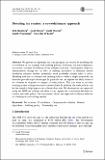Detecting tax evasion: a co-evolutionary approach
Author(s)
Rosen, Jacob; Warner, Geoff; Wijesinghe, Sanith; Hemberg, Erik; O'Reilly, Una-May
Download10506_2016_Article_9181.pdf (2.306Mb)
PUBLISHER_POLICY
Publisher Policy
Article is made available in accordance with the publisher's policy and may be subject to US copyright law. Please refer to the publisher's site for terms of use.
Terms of use
Metadata
Show full item recordAbstract
We present an algorithm that can anticipate tax evasion by modeling the co-evolution of tax schemes with auditing policies. Malicious tax non-compliance, or evasion, accounts for billions of lost revenue each year. Unfortunately when tax administrators change the tax laws or auditing procedures to eliminate known fraudulent schemes another potentially more profitable scheme takes it place. Modeling both the tax schemes and auditing policies within a single framework can therefore provide major advantages. In particular we can explore the likely forms of tax schemes in response to changes in audit policies. This can serve as an early warning system to help focus enforcement efforts. In addition, the audit policies can be fine tuned to help improve tax scheme detection. We demonstrate our approach using the iBOB tax scheme and show it can capture the co-evolution between tax evasion and audit policy. Our experiments shows the expected oscillatory behavior of a biological co-evolving system.
Date issued
2016-04Department
Massachusetts Institute of Technology. Computer Science and Artificial Intelligence LaboratoryJournal
Artificial Intelligence and Law
Publisher
Springer Netherlands
Citation
Hemberg, Erik, Jacob Rosen, Geoff Warner, Sanith Wijesinghe, and Una-May O’Reilly. “Detecting Tax Evasion: a Co-Evolutionary Approach.” Artificial Intelligence and Law 24, no. 2 (April 28, 2016): 149–182.
Version: Author's final manuscript
ISSN
0924-8463
1572-8382